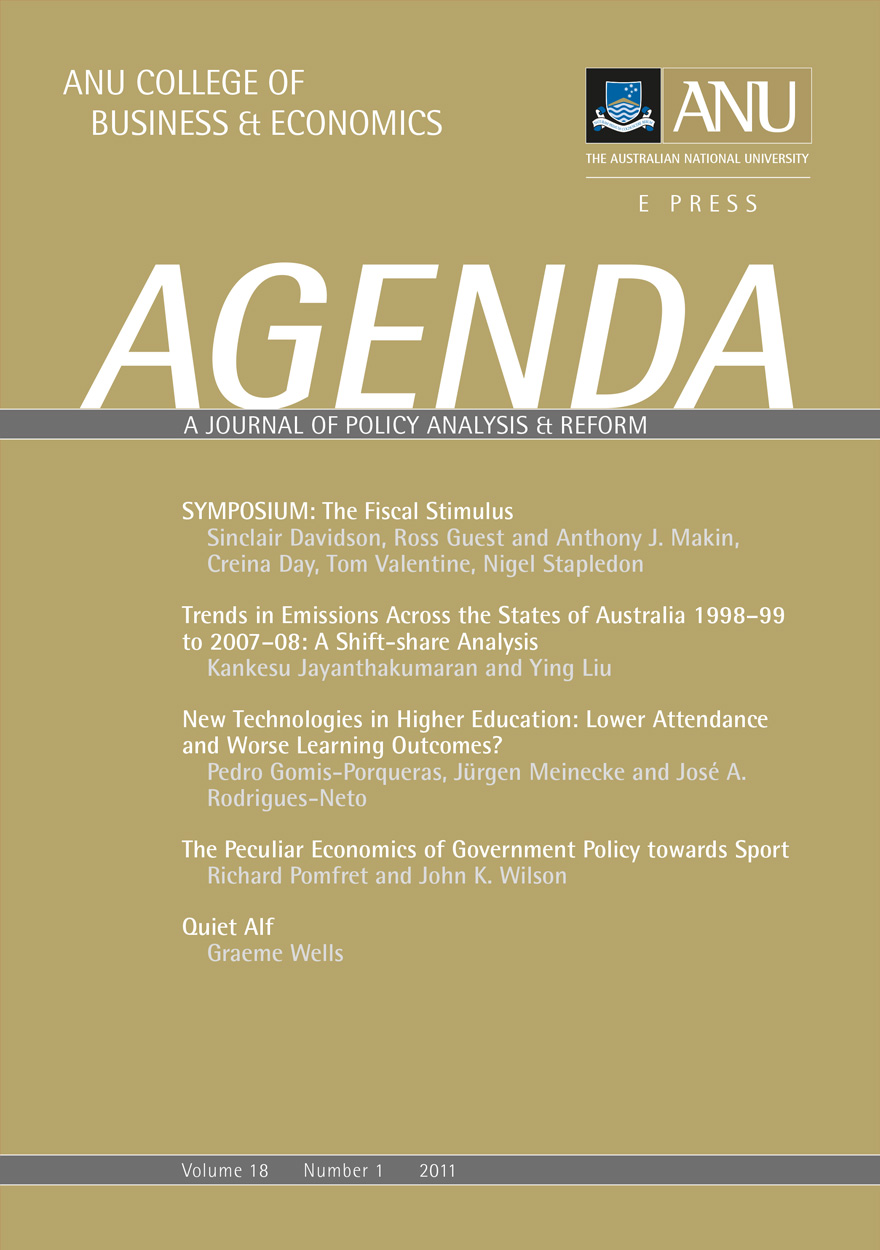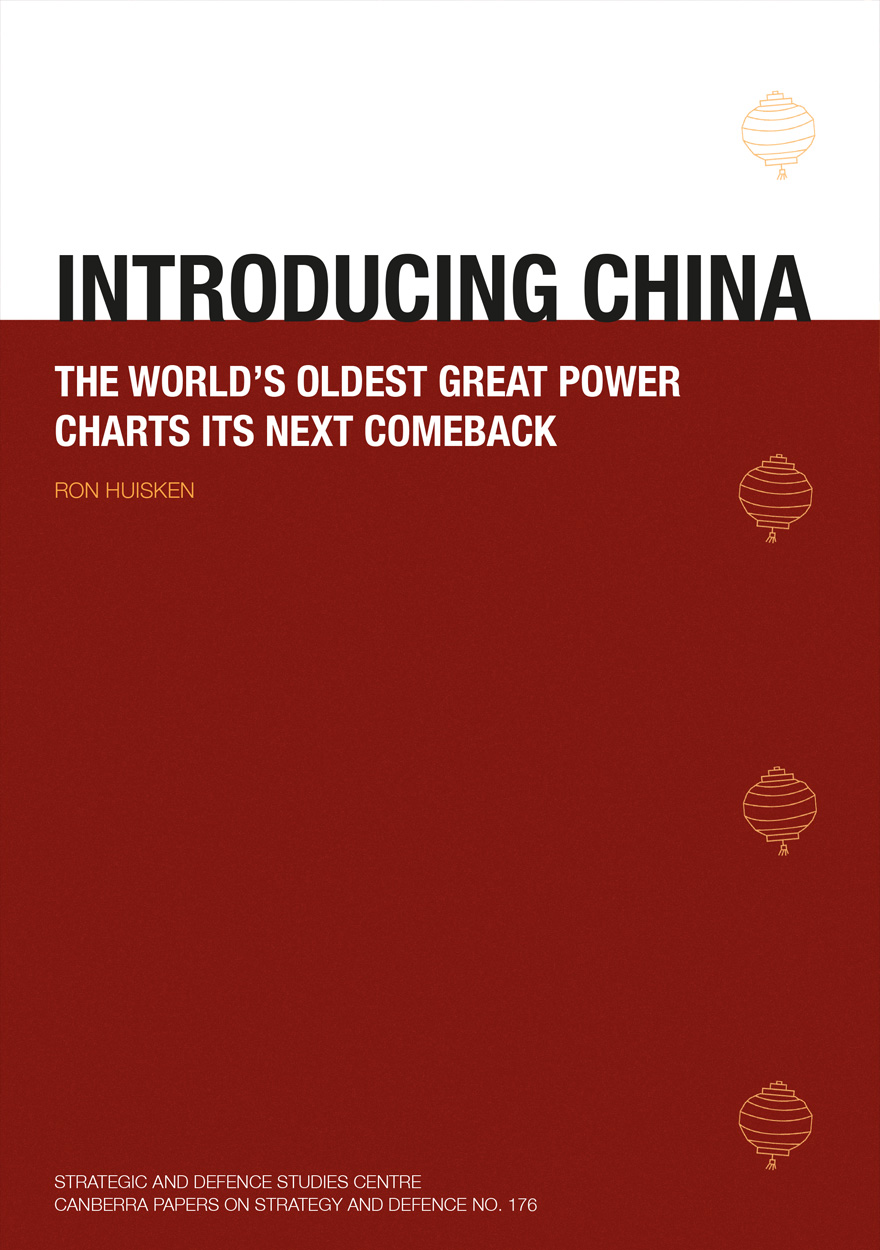Search titles
Displaying results 161 to 170 of 186.

Agenda - A Journal of Policy Analysis and Reform: Volume 18, Number 1, 2011 »
Edited by: William Coleman
Publication date: April 2011
Agenda is a refereed, ECONLIT-indexed and RePEc-listed journal of the College of Business and Economics, The Australian National University. Launched in 1994, Agenda provides a forum for debate on public policy, mainly (but not exclusively) in Australia and New Zealand. It deals largely with economic issues but gives space to social and legal policy and also to the moral and philosophical foundations and implications of policy.
Subscribe to the Agenda Alerting service if you wish to be advised on forthcoming or new issues.
Download for free
Not available for purchase

The Hmong of Australia »
Culture and Diaspora
Edited by: Nicholas Tapp, Gary Yia Lee
Publication date: November 2010
The Hmong are among Australia’s newest immigrant populations. They came as refugees from Laos after the communist revolution of 1975 ended their life there as highland shifting cultivators. The Hmong originate from southern China where many still remain, and others live in Vietnam, Thailand and Burma. Hmong refugees are now also settled in the USA, Canada, France, Germany and French Guyana. Already the beauty and richness of traditional Hmong culture, in particular their shamanism and embroidered costume, has attracted the attention of the Australian public, but little is known about these people, their background or the struggles they have faced to adjust to a new life in Australia.This interdisciplinary collection of articles deals with their music and textiles, gender and language, their social adaptation and their global diaspora. The book aims to bring knowledge of the Hmong to a wider public and contribute to the understanding of these people.

East Asia Forum Quarterly: Volume 2, Number 4, 2010 »
Publication date: October 2010
East Asia Forum Quarterly grew out of East Asia Forum (EAF) online, which has developed a reputation for providing a platform for the best in Asian analysis, research and policy comment on the Asia Pacific region in world affairs. EAFQ aims to provide a further window onto research in the leading research institutes in Asia and to provide expert comment on current developments within the region. The East Asia Forum Quarterly, like East Asia Forum online, is an initiative of the East Asia Forum (EAF) and its host organisation, the East Asian Bureau of Economic Research (EABER) in the Crawford School of Economics and Government in the College of Asia & the Pacific at The Australian National University.
Download for free
Not available for purchase

China: The Next Twenty Years of Reform and Development »
Publication date: July 2010
China has made some remarkable achievements during the first three decades of economic reform and opening up, rising to become one of the world’s most dynamic and globally-integrated market economies. Yet there remains much unfinished business on the reform and development agenda, coupled with newly emerging challenges. China: The Next Twenty Years of Reform and Development highlights how the deepening of reforms in critical areas such as domestic factor markets, the exchange rate regime and the health system, combined with the strengthening of channels for effective policy implementation, will enable China to cope with the challenges that lie ahead. These include responding to the pending exhaustion of the unlimited supply of labour; playing a constructive role in reducing global trade imbalances; enhancing firms’ ability to innovate; coping with migration, urbanisation and rising inequalities on scales unknown in world history; and dealing with rising energy and metal demand in an era in which low-carbon growth has become a necessity rather than a choice.
Chinese translation

East Asia Forum Quarterly: Volume 2, Number 3, 2010 »
Publication date: July 2010
East Asia Forum Quarterly grew out of East Asia Forum (EAF) online, which has developed a reputation for providing a platform for the best in Asian analysis, research and policy comment on the Asia Pacific region in world affairs. EAFQ aims to provide a further window onto research in the leading research institutes in Asia and to provide expert comment on current developments within the region. The East Asia Forum Quarterly, like East Asia Forum online, is an initiative of the East Asia Forum (EAF) and its host organisation, the East Asian Bureau of Economic Research (EABER) in the Crawford School of Economics and Government in the College of Asia & the Pacific at The Australian National University.
Download for free
Not available for purchase

China's New Place in a World in Crisis (Chinese version) »
全球金融危机下的中国:经济、地缘政治和环境的视角
Edited by: Ross Garnaut, Ligang Song, Wing Thye Woo
Publication date: June 2010
2008年的金融危机,使全球状况和中国的世界地位都发生了改变。这场危机加速了中国作为一个有影响力的大国的崛起。本书将对下列问题进行深入探讨:此次全球危机会对中国的增长前景长造成怎样的影响?这场危机的演化和中国的应对举措,会对中国的工业化、城市化进程以及国有企业改革等问题施加何种影响?国际社会将如何应对迅速出现的国际新秩序?中国和其他主要发展中国家将在国际社会中担当怎样的新角色?中国和世界能否打破经济增长和破坏环境的宿命,尤其是如 何解决气候变化问题?
Chinese print version of this book is available from Social Science and Academic Press

Education and Ethics in the Life Sciences »
Strengthening the Prohibition of Biological Weapons
Edited by: Brian Rappert
Publication date: June 2010
At the start of the twenty-first century, warnings have been raised in some quarters about how – by intent or by mishap – advances in biotechnology and related fields could aid the spread of disease. Science academics, medical organisations, governments, security analysts, and others are among those that have sought to raise concern.
Education and Ethics in the Life Sciences examines a variety of attempts to bring greater awareness to security concerns associated with the life sciences. It identifies lessons from practical initiatives across a wide range of national contexts as well as more general reflections about education and ethics. The eighteen contributors bring together perspectives from a diverse range of fields – including politics, virology, sociology, ethics, security studies, microbiology, and medicine – as well as their experiences in universities, think tanks and government.
In offering their assessment about what must be done and by whom, each chapter addresses a host of challenging practical and conceptual questions. Education and Ethics in the Life Sciences will be of interest to those planning and undertaking training activities in other areas. In asking how education and ethics are being made to matter in an emerging area of social unease, it will also be of interest to those with more general concerns about professional conduct.

East Asia Forum Quarterly: Volume 2, Number 1, 2010 »
Publication date: February 2010
East Asia Forum Quarterly grew out of East Asia Forum (EAF) online, which has developed a reputation for providing a platform for the best in Asian analysis, research and policy comment on the Asia Pacific region in world affairs. EAFQ aims to provide a further window onto research in the leading research institutes in Asia and to provide expert comment on current developments within the region. The East Asia Forum Quarterly, like East Asia Forum online, is an initiative of the East Asia Forum (EAF) and its host organisation, the East Asian Bureau of Economic Research (EABER) in the Crawford School of Economics and Government in the College of Asia & the Pacific at The Australian National University.
Download for free
Not available for purchase

Introducing China »
The World's Oldest Great Power Charts its Next Comeback
Authored by: Ron Huisken
Publication date: January 2010
China’s transformation has been patiently, methodically and very deliberately constructed by a leadership group that has equally carefully protected its monopoly on power. Today’s China is proceeding with great seriousness and determination to become a first-rank state with a balanced portfolio of power and no major vulnerabilities. China takes itself very seriously and is inviting the world to overlook the formidable hard power assets it is determined to acquire in favour of simply enjoying the fruits of its market and trusting in the sincerity of its rhetoric on being determined to become a benign and peaceful new-age major power.

Phoenix from the Ashes? »
Russia's Defence Industrial Complex and its Arms Exports
Authored by: Cameron Scott Mitchell
Publication date: December 2009
The continued existence of the Russian defence and arms industry (OPK) was called into question following the disintegration of the Soviet Union in 1991. Industry experts cited the lack of a domestic market, endemic corruption, and excess capacity within the industry as factors underpinning its predicted demise. However, the industry’s export customers in China, India and Iran during those early years became the OPK’s saving grace. Their orders introduced hard currency back into the industry and went a long way to preventing the forecasted OPK collapse. Although pessimistic predictions continued to plague the OPK throughout the 1990s, the valuable export dollars provided the OPK the breathing space it needed to claw back its competitive advantage as an arms producer. That revival has been further underpinned by a new political commitment, various research and development initiatives, and the restoration of defence industry as a tool of Russian foreign policy.
The short-term future of the Russian OPK looks promising. The rising domestic defence order is beginning to challenge the export market as the OPK’s most important customer. Meanwhile, exports will be safeguarded by continued foreign demand for niche Russian defence products. Although the long-term future of the OPK is more difficult to predict, Russia’s solid research and development foundation and successful international joint military ventures suggest that the current thriving trend in exports is likely to continue. Russia represents the next generation of affordable and rugged military equipment for the arsenals of the developing world. Coupled with Russia’s growing ability to rearm itself through higher oil prices and a more streamlined defence industry, the future of the OPK looks bright.



